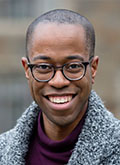Christopher Carlos Brzovic and Julian Turley: Moelis Scholars

 Christopher Carlos Brzovic and Julian Turley have been selected for the Moelis Scholars Program in the department of city and regional planning at the Weitzman School.
Christopher Carlos Brzovic and Julian Turley have been selected for the Moelis Scholars Program in the department of city and regional planning at the Weitzman School.
Established in 2019 through the leadership of Ron Moelis, C’78 W’78, the program prepares students with a commitment to diversity to be the next generation of leaders in the field of urban planning. Students who intend to pursue careers in public/private development or housing, community and economic development are particularly encouraged to apply. Scholars are provided with full tuition for the two years of the program, along with a one-year research assistantship, one year of membership of the American Planning Association post-graduation, and mentorship from a faculty member and Moelis Scholar alumni.
Christopher Carlos Brzovic is pursuing a master of city planning with a concentration in housing, community, and economic development. Mr. Brzovic grew up in San Diego County, California, and first attended Grossmont College. He later graduated summa cum laude from the University of California, San Diego, with a dual major in philosophy and political theory. Mr. Brzovic has worked in housing and homelessness services in Burlington, Vermont, for the past six years, building an entry system that provides coordinated access to housing and services for all households experiencing homelessness in Chittenden County, Vermont. Starting as an AmeriCorps member, he successfully coordinated a homeless registry event, mobilizing volunteers to survey over 200 unsheltered individuals and generating the community’s first by-name list of people experiencing homelessness. Using this data, Mr. Brzovic led the greater Burlington community in adopting Housing First policies and prioritizing supportive housing resources according to need and vulnerability. Working with the statewide Veterans Committee, Mr. Brzovic and his team successfully ended veteran homelessness in Chittenden County, an accomplishment that was recognized by the United States Interagency Council on Homelessness.
In the wake of the COVID-19 pandemic, which has revealed the magnitude of housing precarity in the U.S., Mr. Brzovic has decided to focus his efforts on homelessness prevention by addressing the structural and intersectional determinants of housing precarity and inequality. “Although my dream job may be utopian, it would involve centering social, economic, racial, and environmental justice in all policy and decision-making,” Mr. Brzovic said. “I would ideally work to realign federal, state, and local systems and resources to empower local communities to achieve reparative housing justice and democratically shape their own environments and futures.
Julian Turley is pursuing a master of city planning with a concentration in public and private development. Mr. Turley is from Grand Rapids, Michigan, and graduated with a degree in political science from the University of Michigan. As a student, he served as a research and education chair for the Black Student Union, and co-founded Nomsy, a web and mobile food discovery app for those with dietary lifestyles. After graduating, Mr. Turley moved to Oakland, California, and worked at Code2040, a nonprofit that helps Black and Latinx technologists enter the tech sector through internships. While working to close the racial gap through tech, Mr. Turley observed that much of the wealth created by tech contributed to displacing native residents. He moved back to his hometown to become an entrepreneur-in-residence at Grand Valley State University to help students launch their ventures though the 77IdeaLab accelerator, and became an equity and people researcher at Pink Cornrows, a public policy, communications, and equity firm led by women of color.
Mr. Turley’s mission is to build equitable communities through entrepreneurship. “Within entrepreneurship, the designer methodology requires engaging day-to-day users, understanding their needs, pain-points, and wants to then work with them to have a solution” Mr. Turley said. “As a Black man raised in a single-parent household, my experiences with urban planning have not embodied these elements of equitable design.”
